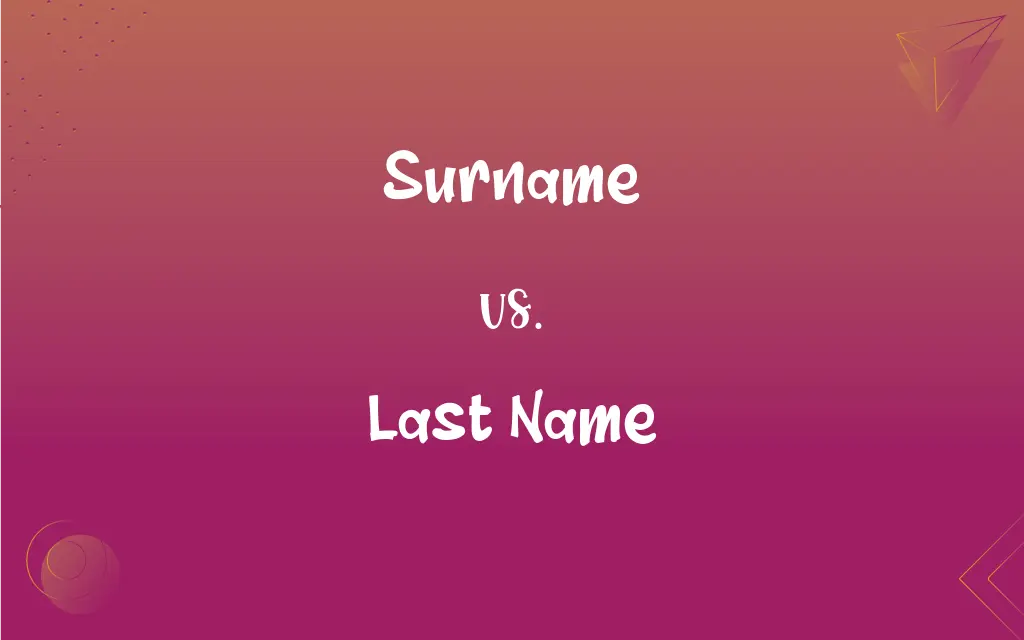Surname vs. Last Name: What's the Difference?
Edited by Aimie Carlson || By Janet White || Published on December 20, 2023
A surname is a family name passed down through generations, while a last name is the final part of a personal name, often synonymous with the surname in Western cultures.

Key Differences
Surnames hold cultural significance, often reflecting family heritage and lineage. Last names, while typically identical to surnames in many cultures, are used more as an identifier in formal and legal contexts.
Historically, surnames were adopted to distinguish between people with the same first name. Last names serve a similar purpose but are more focused on the order of names in a full personal name structure, especially in cultures where the family name may not come last.
In many cultures, the surname is the family name, shared by all members of a family. In contrast, the concept of a last name can vary, with some cultures placing the family name at the beginning of a full name.
Surnames are used across generations within a family and carry ancestral history. Last names are used in official documentation and are typically required in formal registrations and legal documents.
Surnames can change or adapt over generations due to marriage, adoption, or choice. The term last name, while also subject to change, is often used to refer to one's current legal family name in many Western societies.
ADVERTISEMENT
Comparison Chart
Definition
Family name passed through generations
Final part of a personal name
Cultural Variation
Can be first or last depending on the culture
Typically the last part of a name in the West
Usage in Formal Contexts
Used to identify family lineage
Used as an identifier in documents
Changes
Can change due to marriage or choice
Reflects current legal family name
Significance
Reflects heritage and ancestry
Used for official and legal identification
ADVERTISEMENT
Surname and Last Name Definitions
Surname
A family name shared by members of the same family.
Her surname, Johnson, was a common name in the region.
Last Name
The family name in Western naming conventions.
His last name, 'Brown,' was also his father's name.
Surname
A hereditary name common to all members of a family.
She changed her surname after marriage.
Last Name
A surname in many English-speaking cultures.
Her last name, 'Patel,' is a common Indian surname.
Surname
A name passed down through generations.
The surname 'Smith' originated from their ancestors' occupation.
Last Name
The part of a name used for official purposes.
She signed the document with her last name, 'Nguyen.'
Surname
The part of a name indicating family lineage.
His surname, Kim, is very common in Korea.
Last Name
The final part of a personal name.
On the form, she wrote 'Williams' as her last name.
Surname
The last part of a person's name in many Western cultures.
The surname 'Garcia' reflects his Hispanic heritage.
Last Name
A legal identifier in formal contexts.
His last name on the passport was 'Schmidt.'
Surname
A name shared in common to identify the members of a family, as distinguished from each member's given name. Also called family name, last name.
FAQs
What is a last name?
A last name is the final part of a personal name, often a family name.
What is a surname?
A surname is a family name shared by members of the same family.
Can surnames have cultural significance?
Yes, surnames often carry cultural, historical, or ancestral significance.
Does the last name indicate family lineage?
In many cultures, it does, reflecting the family name.
Is the last name always inherited?
Typically, but it can change due to marriage, adoption, or personal choice.
Are surname and last name always the same?
In many Western cultures, they are the same, but this can vary globally.
Do all cultures use surnames?
Most do, but the format and placement of the surname can vary.
How important are last names in legal documents?
Very important; they are used to legally identify an individual.
Can someone change their surname?
Yes, surnames can be changed legally for various reasons.
What's the origin of surnames?
Surnames often originated from occupations, locations, or paternal names.
Can surnames differ within a family?
Yes, due to marriage or personal choice, family members might have different surnames.
Do last names have to be family names?
Generally, yes, though they can be changed or chosen differently.
What role do surnames play in genealogy?
They are essential in tracing family history and lineage.
Can surnames be hyphenated?
Yes, especially in cases of marriage or combining family names.
Why do people have last names?
To distinguish individuals and for legal and official identification.
How do last names function in different cultures?
Their function varies, but they typically serve as a key part of a person's full name.
Are surnames used globally?
Surnames are used worldwide, but their format and significance vary.
Do surnames change across generations?
They can, due to marriage, cultural practices, or personal decisions.
Is the last name essential for identification?
Yes, it is crucial for legal and formal identification in many societies.
Are last names culturally diverse?
Yes, they vary widely across different cultures and regions.
About Author
Written by
Janet WhiteJanet White has been an esteemed writer and blogger for Difference Wiki. Holding a Master's degree in Science and Medical Journalism from the prestigious Boston University, she has consistently demonstrated her expertise and passion for her field. When she's not immersed in her work, Janet relishes her time exercising, delving into a good book, and cherishing moments with friends and family.
Edited by
Aimie CarlsonAimie Carlson, holding a master's degree in English literature, is a fervent English language enthusiast. She lends her writing talents to Difference Wiki, a prominent website that specializes in comparisons, offering readers insightful analyses that both captivate and inform.































































